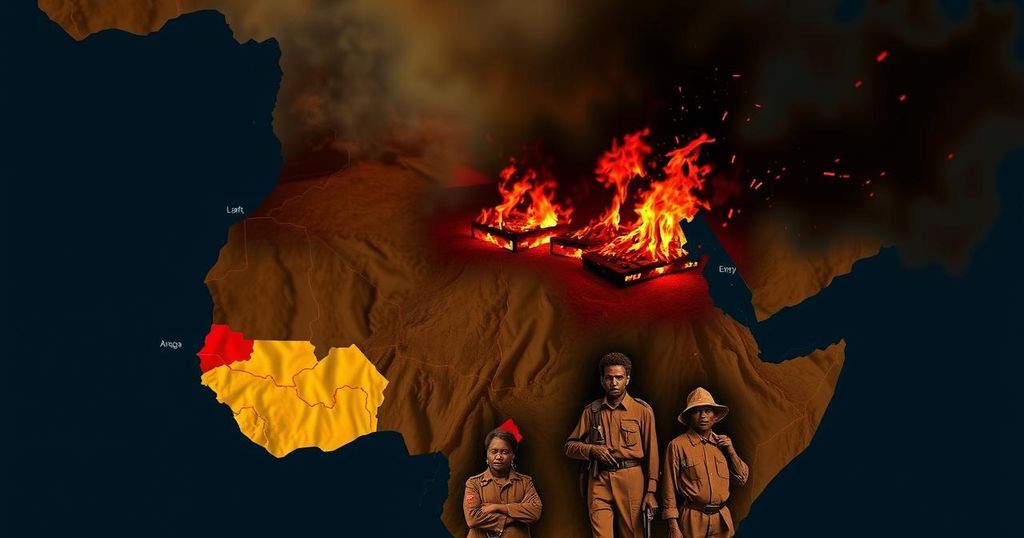World news
AFRICA, AP, AP FOTO, CARLOS U, CARLOS UQUEIO, DANIEL CHAPO, DEMOCRACY, DURANTE LAS, ELEC, EN MAPUTO, FR, HUMAN RIGHTS, JOHANNESBURG, LA CAPITAL DE MOZAMBIQUE, LEBOMBO, LLAMAS, MAPUTO, MOZAMBIQUE, POLITICS, SOUTH AFRICA, SOUTHERN AFRICA, SOUTHERN AFRICAN DEVELOPMENT COMMUNITY, UNA, VE, VENANCIO MONDLANE, VIOLENCE
Michael Grant
0 Comments
The Implications of Post-Election Violence in Mozambique for Southern Africa
Post-election violence in Mozambique following the October 9 elections has led to significant unrest and at least 30 fatalities. Protests against the ruling Frelimo party, allegations of electoral irregularities, and regional trade disruptions due to border closures highlight the broader implications of Mozambique’s instability for Southern Africa. The situation raises alarms about the state of democracy and economic conditions in the region.
In the aftermath of the controversial October 9 elections in Mozambique, significant unrest has erupted as protesters contest the ruling Frelimo party’s extended authority. The situation has escalated, with reports indicating at least 30 fatalities amidst widespread protests challenging the legitimacy of the electoral process. With Venancio Mondlane, the independent candidate who secured 20% of the vote, advocating for nationwide demonstrations, concerns are rising not only within Mozambique but also across the Southern African region. The post-election violence has drawn attention to the state of democracy in Southern Africa. While some nations have conducted credible elections this year, such as Botswana and South Africa, Mozambique’s case highlights ongoing electoral challenges in the region. The European Union’s observer mission has reported irregularities during the elections, such as result manipulations—allegations the Frelimo party consistently denies. As allegations of vote-rigging mar the electoral landscape, countries like Zimbabwe also contribute to the atmosphere of uncertainty regarding democratic processes in the region. From an economic perspective, Mozambique plays a vital role in regional trade, sharing borders with several Southern African nations. Instability often has ripple effects, especially with South Africa abruptly closing its borders due to post-election unrest. This closure has led to significant economic repercussions, with estimations suggesting losses amounting to R10 million ($555,177) daily, as the region relies on Mozambique’s trade routes for minerals and goods. Political stability in Mozambique remains precarious, having only transitioned to democratic elections in 1994 after enduring a brutal civil war. The nation faces challenges from internal conflicts, including ongoing violence attributed to Islamic State-affiliated groups that have displaced many citizens since 2017. Given the vast number of Mozambicans working in neighboring countries, any further instability poses a threat to regional security and could lead to increased migration pressures in Southern Africa.
The post-election violence in Mozambique stems from the disputed results of the October 9 elections, where the ruling Frelimo party retained power amid allegations of electoral malpractice. The protests and unrest not only threaten Mozambique’s internal stability but also raise concerns for the broader Southern African region, where democracy and governance remain a challenge in several states. The reaction of neighboring countries, particularly in terms of border security and economic implications, highlights the interconnectedness of regional politics and the significance of Mozambique’s stability to Southern Africa’s overall security and economic health.
The post-election violence in Mozambique is a pressing concern for Southern Africa, with implications that extend beyond its borders. As the region grapples with varying degrees of democratic integrity, the unrest in Mozambique underscores the need for a committed dialogue aimed at resolving electoral disputes. Additionally, the economic impact of instability in Mozambique on regional trade and migration further emphasizes the importance of ensuring political stability to foster a secure and prosperous Southern Africa.
Original Source: apnews.com




Post Comment